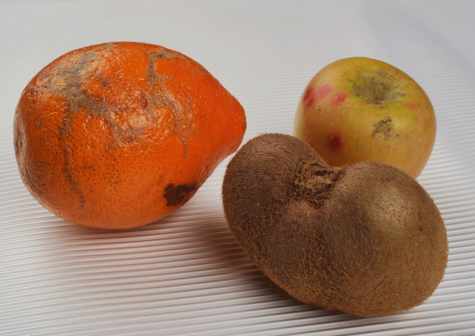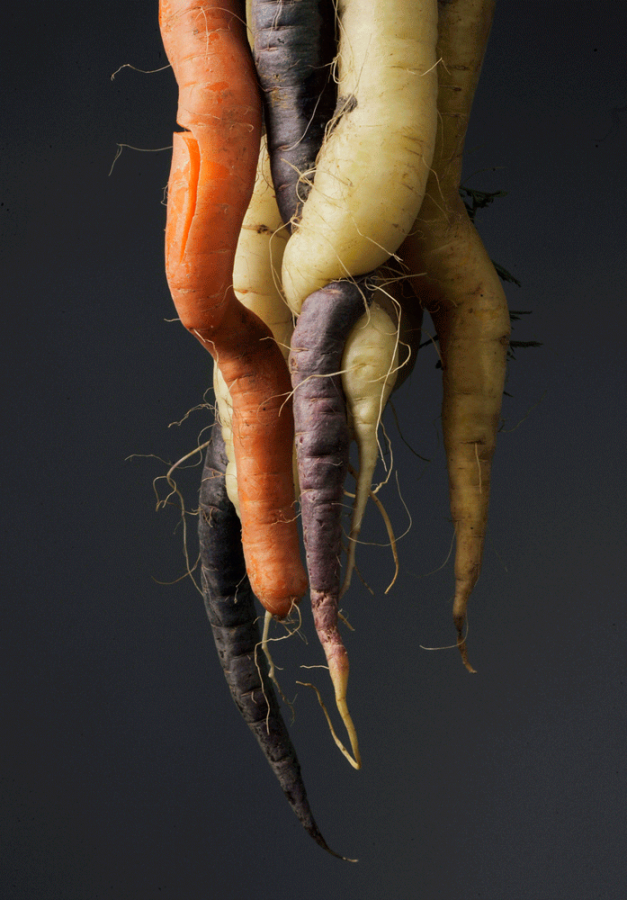Businesses find new opportunity in food that once went to waste
April 20, 2016
Bay Area shoppers will soon be able to get a new kind of local produce at Whole Foods stores.
Affectionately known as ugly produce, the fruits and vegetables are perfectly healthy and safe yet are usually left to rot because they don’t meet typical supermarket cosmetic standards.
Bags of the aesthetically challenged produce will arrive at Northern California Whole Foods outposts later this month. To start, five stores — Berkeley (Telegraph), Oakland (Harrison), Cupertino (Stevens Creek), Santa Rosa (Coddingtown) and Sonoma — will sell ugly produce, thanks to Emeryville’s Imperfect, one of several new Bay Area companies taking advantage of crops that are usually wasted in California fields. The move underscores not only the Bay Area’s growing awareness surrounding food waste, but also a new commercial industry growing around the untapped resource.
Of the estimated 62.5 million tons of food Americans waste annually, much more is generated in homes, stores and restaurants than farms, but the loss at farms is more suitable for reuse.
Restaurants and retail account for an estimated 40 percent of wasted food, one of the reasons California passed AB1826, which went into effect April 1. The bill requires supermarkets and other food companies that produce a certain amount of organic waste to compost or otherwise recycle it, rather than send it to the landfill. California Safe Soil in West Sacramento collects discarded food from Save Mart dumpsters and uses aerobic enzymatic digestion — a combination of enzymes and grinders — to turn it into a liquid fertilizer used by California almond, walnut, wine grape and strawberry growers.
Food not harvested
But farms are still responsible for almost 20 percent of American food waste. For some specialty California crops, such as greens, 50 percent is left in the field because it’s not worth harvesting, said Christine Moseley, founder and chief executive officer of Full Harvest, a San Francisco startup that aggregates ugly produce from Salinas Valley growers for Bay Area food and beverage companies. “I found out that there’s this massive problem with food waste, and I saw that as an opportunity,” said Moseley, who recently moved to the Bay Area from New York with the goal of starting a company that would make healthy food more affordable.
So far, she hasn’t reached that goal because her main clients are high-end organic juice companies like Project Juice and Urban Remedy, but she has projects in the works with larger national companies and has contracts in place to deliver 1 million pounds of imperfect and surplus produce this year.
Juice is a natural fit for ugly produce. Though “juicer” apples have long been available to applesauce and cider producers, there hasn’t been a traditional channel for ugly or surplus versions of most other types of produce, such as the tons of kale, beets, carrots and lemons used in the trending cold-pressed juices.
“In the world of juice, we don’t need it to be perfect, from an aesthetic point of view,” said Paul Coletta, CEO of Urban Remedy, which gets 5,000 pounds of produce from Full Harvest each week, including too-curvy cucumbers and undersized kale leaves.
Moseley spends a lot of time at farms working out ways to make it worthwhile for farmers to harvest their ugly produce and to make sure it meets standards from her buyers, who can’t use anything bruised or punctured but are fine with wind damage, for example, when fruit gets superficial scratches from swaying tree branches.
Since it launched last year, Full Harvest has rescued 15,000 pounds of previously worthless produce — the equivalent of 550,000 gallons of water, Moseley said.
Produce boxes delivered
Even before the new deal with Whole Foods, Imperfect was seeing similar success. Last year, Imperfect began delivering boxes of ugly produce to homes in the East Bay, typically priced 30 percent cheaper than usual supermarket prices. It recently expanded delivery to San Francisco, now delivering over 1,900 boxes per week total.
Cerplus, which launched January, has a similar idea. Co-founder Zoe Wong works with specific farms to find ugly and surplus produce she knows her customers tend to want — caterers, broth or baby food companies, bakeries and even some restaurants — then picks it up from farmers’ markets in San Francisco and Berkeley.
From there, it goes to a warehouse in San Mateo, and she posts it on the Cerplus website, where customers can find excess inventory of avocados, cabbage and even pasture-raised eggs at a 30 to 50 percent discount.
If the food finds a buyer, Cerplus delivers it and the farmer gets paid, which is a better return than they would get if they composted or donated their leftover food. In the past few months, the company has diverted 11,000 pounds of produce.
In addition to the social mission, the price is a draw, said Wong, whose previous company, Revive Foods, made jam with surplus fruit. “A lot of these food businesses are running really tight operations,” she said.
Dan Kurzrock and Jordan Schwartz work with a different type of wasted product: what they call “beer grain,” or the edible by-product of beer production. When they began home brewing as UCLA undergrads in 2009, they noticed that 5 gallons of beer would result in 15 pounds of leftover barley or other grains.
“I was just blown away with all the waste,” said Kurzrock.
A use for beer grains
They started making granola bars with the leftover mix, including barley, oats, wheat and rye, which led to a business, named ReGrained, that launched in 2014. They now pick up the grain from the San Francisco brewers 21st Amendment, Magnolia and Triple Voodoo. Kurzrock notes that breweries have traditionally donated spent grain to hog farms, but that’s more difficult to do from an urban environment; he estimates there are 28 craft breweries in San Francisco alone.
The high-fiber bars are sold at Rainbow Grocery, Gus’s Community Market and Driver’s Market in Sausalito for $2.50 each. They’re not cheap, and neither are cold-pressed juices that use recovered produce from Full Harvest, which start at $7 a bottle (though 4 pounds of produce typically goes into each bottle). But Moseley thinks prices will go down if the organic and healthy food category continues to grow as projected.
“The way (for companies) to differentiate is with pricing,” she said. “Eventually they’ll be able to pass along the discount.”




